泛读全新阅读I_U7_大纲词汇&课文难点&习题答案
- 格式:doc
- 大小:68.00 KB
- 文档页数:6
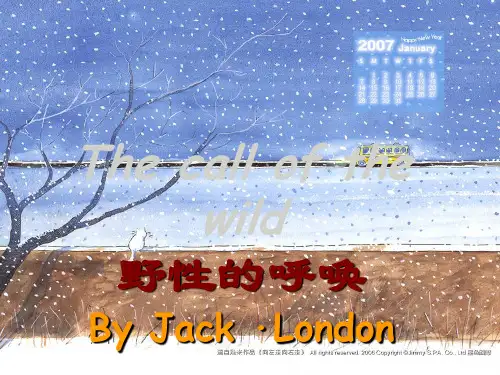
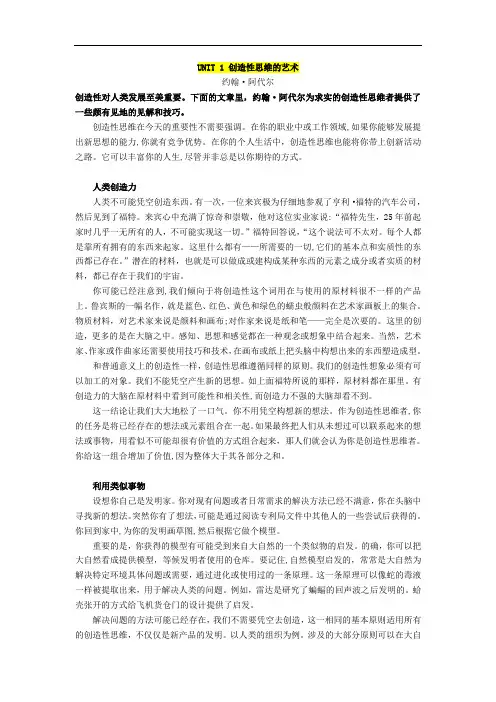
UNIT 1 创造性思维的艺术约翰·阿代尔创造性对人类发展至美重要。
下面的文章里,约翰·阿代尔为求实的创造性思维者提供了一些颇有见地的见解和技巧。
创造性思维在今天的重要性不需要强调。
在你的职业中或工作领域,如果你能够发展提出新思想的能力,你就有竞争优势。
在你的个人生活中,创造性思维也能将你带上创新活动之路。
它可以丰富你的人生,尽管并非总是以你期待的方式。
人类创造力人类不可能凭空创造东西。
有一次,一位来宾极为仔细地参观了亨利·福特的汽车公司,然后见到了福特。
来宾心中充满了惊奇和崇敬,他对这位实业家说:“福特先生,25年前起家时几乎一无所有的人,不可能实现这一切。
”福特回答说,“这个说法可不太对。
每个人都是靠所有拥有的东西来起家。
这里什么都有——所需要的一切,它们的基本点和实质性的东西都已存在。
”潜在的材料,也就是可以做成或建构成某种东西的元素之成分或者实质的材料,都已存在于我们的宇宙。
你可能已经注意到,我们倾向于将创造性这个词用在与使用的原材料很不一样的产品上。
鲁宾斯的一幅名作,就是蓝色、红色、黄色和绿色的蠕虫般颜料在艺术家画板上的集合。
物质材料,对艺术家来说是颜料和画布;对作家来说是纸和笔——完全是次要的。
这里的创造,更多的是在大脑之中。
感知、思想和感觉都在一种观念或想象中结合起来。
当然,艺术家、作家或作曲家还需要使用技巧和技术,在画布或纸上把头脑中构想出来的东西塑造成型。
和普通意义上的创造性一样,创造性思维遵循同样的原则。
我们的创造性想象必须有可以加工的对象。
我们不能凭空产生新的思想。
如上面福特所说的那样,原材料都在那里。
有创造力的大脑在原材料中看到可能性和相关性,而创造力不强的大脑却看不到。
这一结论让我们大大地松了一口气。
你不用凭空构想新的想法。
作为创造性思维者,你的任务是将已经存在的想法或元素组合在一起。
如果最终把人们从未想过可以联系起来的想法或事物,用看似不可能却很有价值的方式组合起来,那人们就会认为你是创造性思维者。
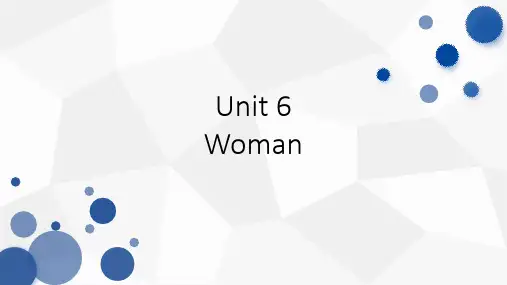
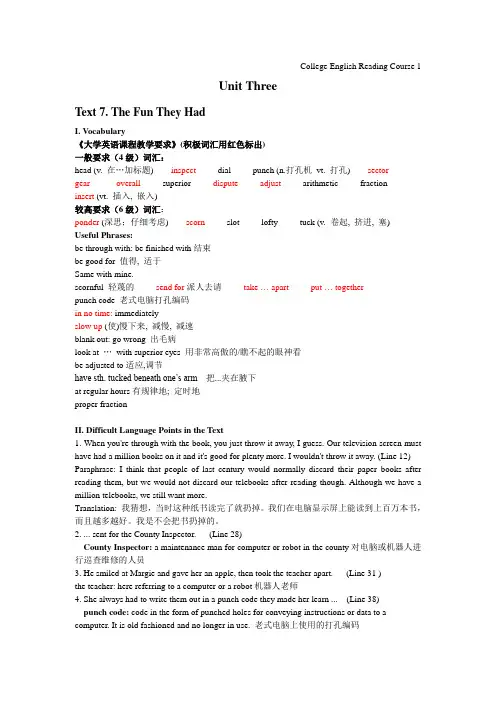
College English Reading Course 1Unit ThreeText 7. The Fun They HadI. Vocabulary《大学英语课程教学要求》(积极词汇用红色标出)一般要求(4级)词汇:head (v. 在…加标题) inspect dial punch (n.打孔机vt. 打孔) sectorgear overall superior dispute adjust arithmetic fractioninsert (vt. 插入, 嵌入)较高要求(6级)词汇:ponder (深思;仔细考虑) scorn slot lofty tuck (v. 卷起, 挤进, 塞)Useful Phrases:be through with: be finished with结束be good for 值得, 适于Same with mine.scornful 轻蔑的send for派人去请take … apart put … togetherpunch code 老式电脑打孔编码in no time: immediatelyslow up (使)慢下来, 减慢, 减速blank out: go wrong 出毛病look at …with superior eyes 用非常高傲的/瞧不起的眼神看be adjusted to适应,调节have sth. tucked beneath one’s arm 把...夹在腋下at regular hours有规律地; 定时地proper fractionII. Difficult Language Points in the Text1. When you're through with the book, you just throw it away, I guess. Our television screen must have had a million books on it and it's good for plenty more. I wouldn't throw it away. (Line 12) Paraphrase: I think that people of last century would normally discard their paper books after reading them, but we would not discard our telebooks after reading though. Although we have a million telebooks, we still want more.Translation: 我猜想,当时这种纸书读完了就扔掉。
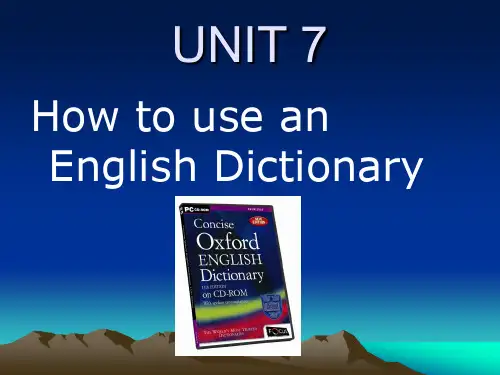
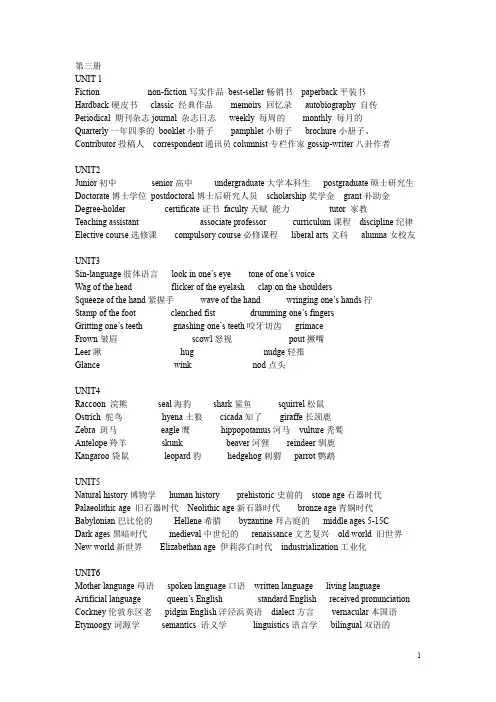
第三册UNIT 1Fiction non-fiction写实作品best-seller畅销书paperback平装书Hardback硬皮书classic 经典作品memoirs 回忆录autobiography 自传Periodical 期刊杂志journal 杂志日志weekly 每周的monthly 每月的Quarterly一年四季的booklet小册子pamphlet小册子brochure小册子、Contributor投稿人correspondent通讯员columnist专栏作家gossip-writer八卦作者UNIT2Junior初中senior高中undergraduate大学本科生postgraduate硕士研究生Doctorate博士学位postdoctoral博士后研究人员scholarship奖学金grant补助金Degree-holder certificate证书faculty天赋能力tutor 家教Teaching assistant associate professor curriculum课程discipline纪律Elective course选修课compulsory course必修课程liberal arts文科alumna女校友UNIT3Sin-language肢体语言look in one’s eye tone of one’s voiceWag of the head flicker of the eyelash clap on the shouldersSqueeze of the hand紧握手wave of the hand wringing one’s hands拧Stamp of the foot clenched fist drumming one’s fingersGritting one’s teeth gnashing one’s teeth咬牙切齿grimaceFrown皱眉scowl怒视pout撅嘴Leer瞅hug nudge轻推Glance wink nod点头UNIT4Raccoon 浣熊seal海豹shark鲨鱼squirrel松鼠Ostrich 鸵鸟hyena土狼cicada知了giraffe长颈鹿Zebra 斑马eagle鹰hippopotamus河马vulture秃鹫Antelope羚羊skunk beaver河狸reindeer驯鹿Kangaroo袋鼠leopard豹hedgehog刺猬parrot鹦鹉UNIT5Natural history博物学human history prehistoric史前的stone age石器时代Palaeolithic age 旧石器时代Neolithic age新石器时代bronze age青铜时代Babylonian巴比伦的Hellene希腊byzantine拜占庭的middle ages 5-15CDark ages黑暗时代medieval中世纪的renaissance文艺复兴old world 旧世界New world新世界Elizabethan age 伊莉莎白时代industrialization工业化UNIT6Mother language母语spoken language口语written language living language Artificial language queen’s English standard English received pronunciation Cockney伦敦东区老pidgin English洋泾浜英语dialect方言vernacular本国语Etymoogy词源学semantics 语义学linguistics语言学bilingual双语的Colloquialism口语体Americanism美国英语slang俚语vulgarism俗语词Euphemism委婉语byword口头禅jargon专业术语Language acquisition语言习得lexicographer词典编纂OEDUNIT 7Astronomy 天文学astronomer天文学家celestial body天体cosmos宇宙Meridian子午线zenith 天顶galaxy星系solar system太阳系The milky way black hole黑洞constellation星座nebula星云Star cluster星束asteroid小行星meteor流星shooting starStar cluster彗星mercury 水星Venus金星mother earthMars 火星Jupiter 木星Saturn土星Uranus天王星Neptune 海王星Pluto冥王星interplanetary flight行星间launch pad发射台Countdown倒计时aeronautics航空学spaceman touchdown降落UNIT 8Feminine gender女性的the fair sex性平等the gentle sex femininity女子气质Womanhood女子成年womanliness女子气质feminism女权主义woman folk女人们Matronage hen party petticoat衬裙maidenlyBachelor girl单身女spinster老处女new woman career woman Suffragette为妇女争取选举权woman’s liberation matron女总管dowager孀居贵妇Wench姑娘lass女孩nymph仙女virago泼妇Amazon高大而强壮的人matriarch 女家长matriarchy 母权制UNIT 10Etiquette 礼仪,礼节extroverts 个性外向的人introverts 性格内向的manner 礼貌Cultural identity conservatism 保守派protocol 礼节,礼仪courtesy 有礼的Gentility 假斯文formality 正式手续decency 正派,端庄,体面cultural norms Cultural values ethnocentric 种族,民族civilized 使文明,使开化ethnic 种族Beaten track 惯例常规second nature decorum 端庄good taste Immersion 专心,投入segregation 分离conventions of societyUNIT 11The Canterbury tales坎特伯雷故事集Hamlet Paradise lost Gulliver’s travels格利佛游记David copperfieldTess of the D’Urbervilles Pygmalion 皮格梅隆Ulysses 尤利西斯The scarlet letter Sister carrie The great Gatsby A farewell to arms Native son Light in august beloved Romance of three kingdoms Water margin pilgrimage to the west A dream of red mansionsUNIT 12Ecology 生态学botany 植物学green-house effect 温室效应biogenetics 生物发生的Microbiology 微生物的nature study 自然学biochemical 生物化学naturalistGlobal warming 全球变暖contamination 污染deforestation 砍伐森林fauna 动物群Land erosion 土壤侵蚀extinct species 灭绝的种族endangered species 濒临灭绝种族Genetics 遗传学ozone damage 臭氧层破坏water resources 水资源flora 植物群Sustainable development 可持续发展greenpeaceUNIT 13Influenza 流感pneumonia 肺炎bronchitis 支气管炎tuberculosis 结核(尤其是肺结核)Asthma 哮喘病scarlet fever 猩红热cholera 霍乱diarrhea 腹泻syphilis 梅毒Allergy 过敏症insomnia 失眠dyspepsia 消化不良migraine 偏头疼jaundice 黄疸Ulcer 胃溃疡rabies 狂犬病leprosy 麻风病anemia 贫血症hemorrhage 出血,溢血Apoplexy 卒中,脑卒中meumatism 风湿病arthritis 关节炎rickets 由于缺少维生素D而患的儿童佝偻病UNIT 14Organism 生物体organic matters living beings biology 生物学biologist生物学家Natural history 自然历史anatomy 解剖学physiology 心理学zoology 动物学Zoologist 动物学家botanic garden 植物园evolution 进化natural selectionSurvival of the fittest Darwinism 进化论neo-Darwinism 新达尔文主义Darwinism 达尔文主义者evolutionist 进化论学家UNIT 15Accelerator 加速器,油门automatic transmission brake 刹车dashboard 仪表板Four-cylinder engine headlight前灯,车头灯honk汽车喇叭声ignition 点火装置Inflation 通货膨胀instrument panel liter 公斤mileage 行驶历程sedan 大轿车Manual transmission posted speed limit rental car 租得车seat belt 安全带Steering wheel 转向轮胎taillight 尾灯ticket 票wiper 刮水器Trunk 树干,躯干turn signals 转向信号wagon 铁路货车UNIT 16The beginning of spring 开春the spring equinox the beginning of summer 初夏The summer solstice the beginning of autumn 初秋the autumn equinoxThe beginning of winter e初冬the winter solstice AD(Anno domini)AC(Ante Christum) BC(before Christ) BCE(before the Christian era ) Millennium一千年,千年期era 时代epoch 时代,纪元UNIT 17Anchorman 主持人cameraman 摄影师CNN commercial 商业的star TV episode 一集,一节MTV soap opera 肥皂剧televise 用电视播放TV series VCR cable TV network closed circuit video recorder Videotape 录音带telecast 电视广播live transmission sitcom(situation comedy)情景剧第一册UNIT 18Allegory 寓言characterization 刻画,表现episode 一段经历,插曲fairy tale 神话Character 人物description 描述fable 寓言,伊索寓言fantasy 幻想,想象,幻想作品Fiction 小说mystery 秘密plot 情节,布局,阴谋science fiction 科幻小说Gothic 哥特人的,哥特族的narration 叙述,讲述,解说,旁白point of viewSetting 情节growth novel 成长小说narrator 叙述者,讲述者,解说员hero 英雄Protagonist 主要人物,主角short story 短篇故事novel 小说realism 现实主义suspense 担心,焦虑heroine 女英雄novelette 中篇小说,很蹩脚的小说romance 浪漫Theme 主题modernism 现代化novella 中篇小说satire 讽刺,讥讽thriller 恐怖小说UNIT 17Afraid 恐怕,害怕eccentric 古怪的impatient 没有耐心的rigid 死板的,僵硬的Ambitious 有志向的egotistical自大的,自负的independent 独立的self-concerned Boring 厌烦的energetic 精力充沛的interesting 有趣的sensitive 敏感的Careful 细心的enthusiastic 热情的kind 友好的fair 公平的Loyal 忠诚的skilled 技术娴熟的serious 认真的clever 聪明的Friendly 友好的open-minded 心胸开阔的solitary 独自的cold 寒冷的Generous 大方的optimistic 乐观的steady 稳步的cool 凉爽的Gentle 温柔的orderly 有秩序的strong 强壮的curious 好奇的Hard-working 努力工作的patient 耐心的stubborn 固执的different 不同的Helpful 有帮助的perfect 完美的successful 成功的honest 诚y实的Diplomatic圆滑的popular 流行的systematic 系统的distant 距离Imaginative 想象的proud 自豪的traditional 传统的dreamy 梦想的Impassive 神情冷漠的quiet 安静的understanding 杰出的UNIT 16Stress 忧虑,担心的neurosis 神经机能病gym 体育馆yoga 瑜伽Anxiety 忧虑,担心waistline 腰围pressure 压力hiking 远足Fatigue 疲劳,劳累body shape 外形coach 教练sit-up 仰卧起坐Appetite 胃口,欲望physical therapy 物理疗法aerobics 有氧运动weight-lifting举重Insomnia 失眠physical exercise 身体运动gymnastics 体操push-up 俯卧撑Amnesia记忆丧失warm-up 变暖,温暖jogging 慢跑meditation 冥想Exhaustion 精疲力竭workout 集训shaping舍宾zen 禅宗UNIT 15Access 入口,进入debug 输出keyboard 键盘random access 任意今入Application 申请desktop 台式的laptop笔记本电脑scanner 扫描器BBS digit 数字modem 调制解调器search engineBinary 二进制display 显示monitor显示器server 服务器Bit 稍微,少量download 下载mother board 母版shareware 共享软件Browser 浏览器drive 使移动到mouse 鼠标signal 信号Bug 数据错误driver 驱动程序MUD software 软件Byte 字节e-mail 电子邮件multimedia 多媒体技术system 系统Card 计算机技术file 文件network 网络系统terminal 终点端CD-ROM firewall 防火墙online 在线update 更新Chip 炸薯条floppy disk 软磁盘OS URLCircuit 电路freeware 免费软件output 输出;软件包virtual 模拟的Code 代码hacker 黑客package 掌上电脑virus 病毒Computer language 计算机语言hard disk palmtop 外围设备web browser 网页浏览器Connection 连接hardware 硬件peripheral equipment webcourse Courseware 课件homepage 主页personal computer web site 网址CPU中央处理器input 输入physical memory word processor文字处理器Data processing 数据处理integrated circuit 集成电路printer 打印机Database 数据库internet 因特网program 项目UNIT 14Easter Island 复活岛yeti 雪人Bermuda triangle UFOPyramid金字塔Atlantis loch ness monster bigfootMaya civilization 玛雅文明Stonehenge 史前巨石柱tungus explosionUNION13abnormal反常的 adjustment调整 am nesia健忘症 blind spotacquision获 adolescence青春期 antisocial反社会的cathasis精神发泄adaptation适应 aggression 侵略 aptitude才能cogniton认识addiction 沉溺 altruism 利他注意 behaviorism 行为主义conformity 遵从conscious 意识到 indentive 激励 norm 常态 reflex 反射动作denial 否定 inhibition 拘谨 obedience 顺从 schema 提要deviant 不正常 insomnia 失眠症 paranoia 妄想症schizophrenia 精神分裂distress 忧虑 instinct 本能 passion 激情selective attentiondrive 驾驶 integrity 诚实 perception 直觉 self conceptego 自我价值感 intelligence 智力 personality 个性 sele monitoringemotion 情感 introspection 反省 phobia 恐惧症stereotype 模板empathy 同感 intuition 凭感觉知道 preconscious stimulantEQ IQ prejudice偏见superegoeustress mania 癖 projection 预测suppressiongender 性别 mental age psychiatrist精神分析temperamenthallucination 幻觉 mood 情绪 psychoanalysis精神病学家traithypnosis 催眠状态 motivation 动力 psychotherapy 心理学疗法unconscious 不清醒的id 本我 nervous system recognition 识别 withdrawalUNIT12agronomist农艺学家 fodder grain草料 manure肥料 ranch牧场animal husbandry耕作 foodstuff食品 market garden reap收割barn粮仓 fruit grower meadow草地 rice米beef牛肉 furrow沟 mutton羊肉 seedboar野猪 graft嫁接 oil plant橄榄油 sesame芝麻bean豆 fruits水果 mechanization机械化 season季节broadcast sowing grain谷物 olive果园sharecropper佃户calf小牛 greenhouse parasite寄生虫 shepherd 牧羊人carrot胡萝卜 harvest丰收 pasture牧场 soil土corn玉米 haystack大干草堆 pea豌豆 sowcereals谷类 hay干草 pasture land sorghum高粱cow奶牛 herbicide除草剂 peanut花生 soybeancowboy牛仔 horticulture园艺 pesticide杀虫剂 stable稳定的crop rotation insecticide杀虫剂 piglet小猪 sugar beet crop year irrigation 灌溉 pigpen猪舍 terracedairy farm kitchen garden plantation大农场 thresh梯田dry farming lamb羊羔 pork猪肉 turkey火鸡ewe母羊 land reclamation开垦 prairie大草原 turnip萝卜farmhouse landowner地主 produce生产 weeds除草fertile肥沃的 locust蝗虫 ram母羊山羊academic year学术年activity活动assignment 任务attendance出席auditorium 听众席cafeteria自助餐厅campus 校园canteen 食堂cheating classroom教室 compulsory course必修课computer lab 网吧credit 赊购curriculum全部课程dean 学院院长degree学位diploma文凭课程discipline纪律dormitoy寝室dorm mate舍友elective course选修课enrollment extra -curricularfacultygymnasium体育higher education高等教育 humanities人文科学lecture hall学术报告厅liberal arts library图书馆major主要的minor较小的office hours 工作时间oral examination 口语考试participation比赛physical educationplagiarism抄袭registration 登记regulation研讨research 研究scholarship 奖学金science semester学期seminar 研讨课social sciences社会科学society staff student union 学生会subject teaching building term paper tutorial导师的undergraduate本科生 written test笔试UNION12custom behavior convention习俗foodtraction ritual礼节 kinship亲属关系differencefolkway 民间ceremony 典礼ethics 道德similarity相似处dialect方言religion宗教routine常规interpersonalslang俚语community社区travel cross-culturaljargon行话manner transportationaccentenvironment etiquette 礼节invitation communicationUNIT11adman广告人 campaign运动 flyer小传单 publicist广告员ad writer agent代理人 brochure资料手册 public relationadvertise打广告 client委托人 pubicity宣传 image图片advertising做广告 audience观众 celebrity名人 message信息advertiser广告商 consumer消费者 authority权力 packagingadvertisement广告 media媒体 banner旗帜expenditure开销commercial商业的 design设计 poster海报 feedback promotion促进 billboard告示板 classified ads reaction 反应UNIT10Special Days in ChinaSpring Festival春节 Lantern Festival元宵节 Dragon-Boat Festival 端午节Moon Festival中秋节 New Year’s Day 元旦节 National Day国庆节Special Days in Western CountrisesFather's Day Mother's Day Fool's DayBoxing Day Labor Day 劳动节 independent DayUNIT9abbey隐修院 catholic基督教 devil魔鬼 holy scripture圣经altar圣坛 chapel小教堂 disciple信徒 holy spirit圣灵angel天使 choir合唱 ecstasy狂喜limbo林波舞Anglican圣公会 chastening洗礼 Eden伊甸园 lord 上帝apocalypse世界毁灭 Christianity基督教 faith信念 mass 群众archangel总领天使 church教堂 Father圣父miracle圣迹archbishop总主教 commandments follower信徒monastery修道士baptism洗礼 communion告诫 God monk道士bible圣经 confession证书 gospel福音书 New Testament圣经新约bishop主教 confirmation坚信 grace上帝恩典 nun尼姑brother 宗教团体 convent女隐修院 heaven天堂offering供品cardinal枢机主教 cross十字 hell地狱 Old Testament圣经旧约cathedral教堂 crucifixion十字架 Holy Ghost圣灵paganism异教徒paradise天堂 prophet先知 sacrilege亵渎temptation引诱piety虔诚 protestant新教教徒 sermon讲道 savior 救星Pope教皇 psalm赞美诗 sistertrinity三位一体prayer祷告 pulpit小讲台 Son圣子 vision 视野priest神父 sacrifice牺牲 soul灵魂 worship 崇拜UNIT8anthropology人类学 settler定居者 rite典礼guardian守卫者archeology考古学 chief主要的 worrior武士headdress头饰ethnicity种族 ceremony典礼 hunting costume套装colonization新大陆殖民 ritual仪式上的 legends传说craft手艺工艺totem图腾 shaman萨满 oral traditional ornament装饰品taboo禁忌 superstition迷信 canoe独木舟dwelling住宅tribe部落 religion宗教 bow蝴蝶结folklore民间传说clan家族帮派 worship崇拜 arrow箭reservation预订预约tribesman部落职员 deity女婢 spear矛migration迁移UNIT7active积极的 contenmplative深思熟虑的 faithful信任的inventive发明的adaptable适应的 cooperative合作的 forceful强制的 just adriot精明的 creative创造性的 frank坦然的kind-hearted热心肠的aggressive好斗的 dashing风度翩翩的 frugal节约的learnedalert警觉的 dedicated忠诚的 generous慷慨的liberal心胸开阔的ambitious雄心的 devoted gentle文雅的logical合法的amiable有好的 dependable可靠的 hard-workingloyal忠诚的amicable diplomatic灵活的 honest诚实的methodical有条理的aspiring抱负的 disciplined遵纪的 hospitable好客的modest谦虚的audacious大胆的 dutiful尽职尽责的 humble谦虚的motivated目标明确的capable dynamic精力充沛的 humorous幽默的objective客观的careful认真的 earnest认真的 impartial不偏袒的open-minded思想狭窄的candid坦率的 efficient高效的 independent独立的orderly有秩序的competent胜任的 energetic精力充沛的 industrious勤奋的original有序的confidant自信的 enthusiastic热情的 ingenious心灵手巧的的practical实践的conscientious意识清醒的expressive富有表现力的 intelligent precise精确的persevering坚韧不拔的 reasonable合理的 sensible明智的systematic有条不紊的purposeful有目标的 reliable可靠的 sincere真诚的strong-willed意志坚定qualified资格的 responsible负责任的 smart聪明的sweet-tempered性情温和rational理性的 self-conscious害羞的 spirited精神饱满的temperate有脾气的realistic现实的 selfless无私的 steady稳定的timid胆小的UNIT6referee裁判员 runner- up 亚军 vaulting horse 跳马sidestroke侧冰coach 教练bronze medalist铜牌 pommel horse 鞍马butterfly stroke蝶泳contestant选手track and 田径balance beam dolphin stroke海豚式游泳professional athletics ball games platform 跳台amateur业余的 high jump跳高 racket球拍 springboard跳板championship冠军赛 pole jump撑杆跳 bat木制拍 diving潜水 record holder long jump 跳远 handball 手球 softball垒球 canoeing皮划艇运动 springboard 跳板 triple jump三级跳 martialarts 武术javelin throw标枪ice sports yachting 快艇sportsmanship体育精神 discus throw 铁饼比赛 ice hockey曲棍球 weightlifting举重sports venue体育会馆hammer throw链球speed skating速滑heavyweight tournament锦标赛 Marathon 马拉松 figure skating花样滑冰middleweight host country东道国 relay race 接力赛 cross country ski越野滑雪 skating rink滑冰场lightweight 轻量级拳击选手 boxing拳击 gymnasium体育馆 walking race竞走alpine skiing高山滑雪 wresting摔跤 spectator观众 acrobatic杂技water sports水球 fencing击剑 cheer-leader拉拉队长 gymnastics体操water polo水球shooting射击 home team主队horizontal bar单杠water-skiing archery射箭 team eventparallel bars 双杠 surfing冲浪 cycling individual event个人项目 uneven bars natatorium游泳池 mountaineering 登山 women's event女子比赛 rings吊杆 breaststroke蛙泳 horsemanship骑马术 stadium比赛场地 hurdle race跨栏赛NIIt5production patron captial merchant 商人marketing促销board of directors finance commerce 商业advertising ownership所有权wholesale travel volume 贸易额client当事人joint venture retail零售dealstock exchange tax tertiary industry第三产业circulation 流通loan 贷款tariff税率agent purchaselease租约export barter以物易物private sectorpatent专利import currency货币dumpingeconomy of scale textile纺织品discount折扣subsidy补贴金market economy electronics电子器件trademark headquarterfutures service brand budget预算benefit commodity 商品consumer顾客management经营UNIT4snack 快餐ginger 生姜spinach 菠菜black tea红茶potluck家常便饭shrimp虾buffetprawn虾steak 牛排mustard红芥refreshments 饮料crayfish龙虾pie 派pepper胡椒banquet 宴会sausage香肠brown sugar红糖cooker厨具roast烧烤mutton羊肉pan 煎盘cuisine 风味jellyfish水母mince 绞肉机wok炒菜锅pork精肉pickles泡菜liquor烈性酒pot锅sauce调料汁broth 肉汤champagne香槟酒kettle水壶barbecue soupmineral water dry beer boil油stew 焖chew咀嚼taste steam 馒头roastswallow咽appetite fry grill烤架nibble小口咬delicious deep fry cookdiet crunchy 脆的stir fry eatnutrition tasty simmer用文火炖drinkflavor spicy 多香料的UNIT3acting leading actor主角 screenplay电影剧本montage剪辑组合物animation 生气,富有活力substitute代替物script 电影剧本sound effects 音效cartoon 卡通cinema照相机scene 现场dubbing把当做romance 浪漫史movie theater 电影院spotlight聚光灯studio摄影棚thriller惊险小说premiere首次公映lighting stage propertyslapstick 打闹剧film festival shooting microphone 麦克风feature特征distributor赞助商 fade out声音减弱drive- in cinematheme song 主题曲producer fade in 音量减小documentary纪录片director导演 adaptation 适应,改编本 special effects特效UNIT2custom 习俗 behavior convention foodtradition传统 ritual礼节 kinship亲属关系 differencefolkway 民间 ceremony 典礼 ethics 道德 similarity相似处dialect方言 religion宗教 routine常规 interpersonal slang俚语 community社区 travel cross-cultural jargon行话 manner transportation accentenvironment etiquette 礼节 invitation communication UNIT1academic year学术年 activity活动 assignment 任务 attendance出席auditorium 听众席 cafeteria自助餐厅 campus 校园 canteen 食堂cheating classroom教室 compulsory course必修课 computer lab 网吧credit curriculum全部课程 dean 学院院长 degree学位diploma文凭课程 discipline纪律 dorm mate舍友 elective course选修课enrollment 总册 extra -curricular faculty 天赋 gymnasium体育higher education humanities人文科学 lecture hall liberalstudent arts library major minormonitor班长 office hours oral examination participation physical education plagiarism抄袭 registration 登记 regulation研讨research 研究 scholarship 奖学金 science semesterseminar social sciences society社会 staff职员student union学生会 subject teaching building term paper tutorial辅导课 undergraduate本科生 written test。
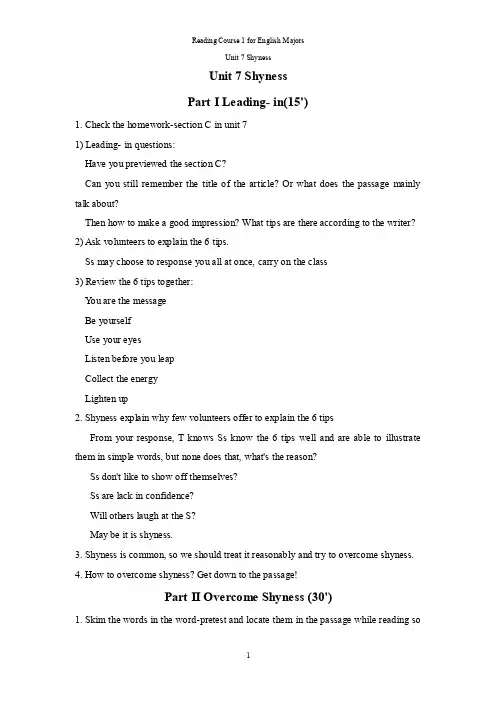
Unit 7 ShynessPart I Leading- in(15')1.Check the homework-section C in unit 71) Leading- in questions:Have you previewed the section C?Can you still remember the title of the article? Or what does the passage mainly talk about?Then how to make a good impression? What tips are there according to the writer?2) Ask volunteers to explain the 6 tips.Ss may choose to response you all at once, carry on the class3) Review the 6 tips together:Y ou are the messageBe yourselfUse your eyesListen before you leapCollect the energyLighten up2.Shyness explain why few volunteers offer to explain the 6 tipsFrom your response, T knows Ss know the 6 tips well and are able to illustrate them in simple words, but none does that, what's the reason?Ss don't like to show off themselves?Ss are lack in confidence?Will others laugh at the S?May be it is shyness.3.Shyness is common, so we should treat it reasonably and try to overcome shyness.4.How to overcome shyness? Get down to the passage!Part II Overcome Shyness (30')1.Skim the words in the word-pretest and locate them in the passage while reading soas to better understand their meaning.2.Read the passage and underline the part you don't understand.3.After reading, judge the statements in the exercises.4.Check Ss understanding. keys:FTFTFTTF5.Probable difficulties:1) Feeling ashamed will not do any good.Just to feel ashamed will not solve the problem, or is not useful.2) We are interesting in our own personal ways.We ourselves are interesting because of our unique personality or our unique ways to be ourselves.6. Useful words:excessively: do or behaviour too muchoverdoing: over- as a prefixoverestimate, oversleep, overhear, overcome7.Reading skill-class relationship, contrast relationship, synonym, antonym1) self-esteem is similar with self-worth2) compliment--praise3) detrimental-- harmful4) diminish is opposite to grow5) negative is opposite to positivePart III V ocabulary-building (20')1.Word-matchDo the exercise quickly, repeat what Ss make mistakes inIntroduce some relevant words or phrase.Intelligent --IQ intelligent qualityCommit- to do sth or make a promisecommit suicide2.AffixLet Ss speak the words they can think as many as possible and repeat their wordsExplain some words easily mistakenedengagement of sb to sb/ marry sbAgreement or disagreement in sentence 6?As for this part, the logic mistake appears, which is also an exam point in the ERROR CORRECTING of TEM 43.Look up the words in the glossary after class4.Do the cloze after classPart IV Fast- reading and Presenting1.Divide the class into 4 groups, and each group is assigned to read one passage in the SECTION B and then one S should stand up to be on behalf of his group and present the main ideas or information of the passage2.Give Ss time to prepare and inspire them to show his understandingPassage one:Fact:40% American are shy, even the president, the princess and the pop starA quarter of the people who are shy as adults were not shy when they were a childResult: Shyness may cause difficulties in communication with others even the best friendsPassage two:Reason: worry about making themselves foolWorry about making a mistakeWorry about how they are speakingCare too much about others' feeling of themselvesTips to overcome: speak in the front of mirrorPractice more to be mentally preparedWrite down the main points in case they skip out of your mindGive speech in front of your friendsAttitude: Everyone makes mistakes, treat your shyness reasonalblyPassage three:Reasons: 1. Inherit from parents2. Nobody tells us social skills3. It was thought that to be shy can get extra love and care when we were childrenShyness can be avoided: Force to do things you won't offer to doPraise those who are shyPassage four:Fact: all people blush, women blush more than men, young people blush more than old peopleReason: worried or nervousWhen others are better than themselves3.Add more explanation to make the rest of class if necessary.4.Check their understanding:Keys: FTT/ TF/ TFT /BCPart V AssignmentPreview the section C in Unit 8 and review what we've learnt in the class。
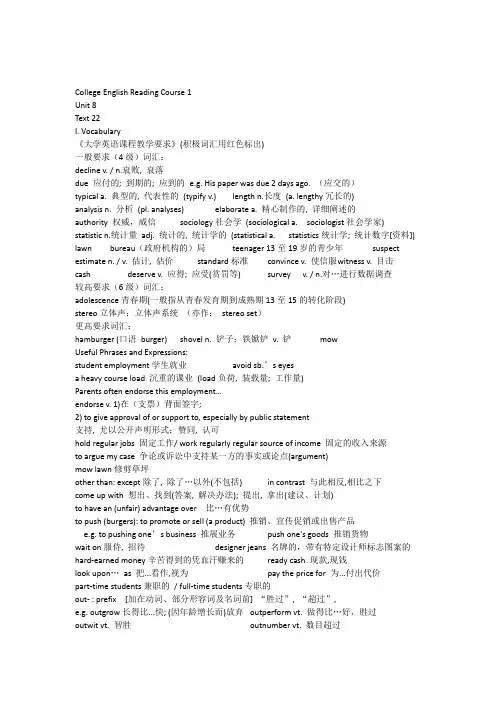
College English Reading Course 1Unit 8Text 22I. Vocabulary《大学英语课程教学要求》(积极词汇用红色标出)一般要求(4级)词汇:decline v. / n.衰败, 衰落due 应付的; 到期的; 应到的e.g. His paper was due 2 days ago. (应交的)typical a. 典型的, 代表性的(typify v.) length n.长度(a. lengthy冗长的)analysis n. 分析(pl. analyses) elaborate a. 精心制作的, 详细阐述的authority 权威,威信sociology社会学(sociological a. sociologist社会学家) statistic n.统计量adj. 统计的, 统计学的(statistical a. statistics统计学; 统计数字[资料]) lawn bureau(政府机构的)局teenager 13至19岁的青少年suspect estimate n. / v. 估计, 估价standard标准convince v. 使信服w itness v. 目击cash deserve v. 应得; 应受(赏罚等) survey v. / n.对…进行数据调查较高要求(6级)词汇:adolescence青春期(一般指从青春发育期到成熟期13至15的转化阶段)stereo立体声;立体声系统(亦作:stereo set)更高要求词汇:hamburger (口语burger) shovel n. 铲子;铁锨铲v. 铲mowUseful Phrases and Expressions:student employment学生就业avoid sb.’s eyesa heavy course load 沉重的课业(load负荷, 装载量; 工作量)Parents often endorse this employment…endorse v. 1)在(支票)背面签字;2) to give approval of or support to, especially by public statement支持, 尤以公开声明形式;赞同, 认可hold regular jobs 固定工作/ work regularly regular source of income 固定的收入来源to argue my case 争论或诉讼中支持某一方的事实或论点(argument)mow lawn修剪草坪other than: except除了, 除了…以外(不包括) in contrast 与此相反,相比之下come up with 想出、找到(答案, 解决办法); 提出, 拿出(建议、计划)to have an (unfair) advantage over 比…有优势to push (burgers): to promote or sell (a product) 推销、宣传促销或出售产品e.g. to pushing one’s business 推展业务push one's goods 推销货物wait on服侍, 招待designer jeans 名牌的,带有特定设计师标志图案的hard-earned money辛苦得到的凭血汗赚来的ready cash 现款,现钱look upon…as 把...看作,视为pay the price for 为...付出代价part-time students兼职的/ full-time students专职的out- : prefix [加在动词、部分形容词及名词前] “胜过”, “超过”,e.g. outgrow长得比...快; (因年龄增长而)放弃outperform vt. 做得比…好,胜过outwit vt. 智胜outnumber vt. 数目超过II. Difficult Language Points in the Text1. Yet in all the lengthy analyses of what's wrong with American education, I have not heard employment by students being blamed. (Line 14)employment by students: having part-time job while studying in school or university Translation: 但是在所有这些冗长的关于美国大学教育问题的分析中,我没有见到有对学生打工进行批评的言论。
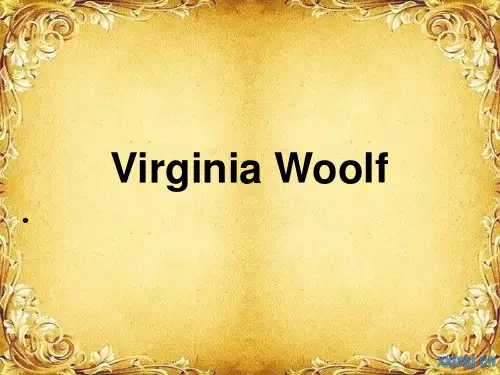
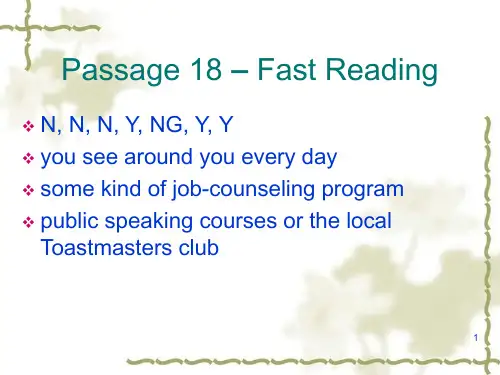
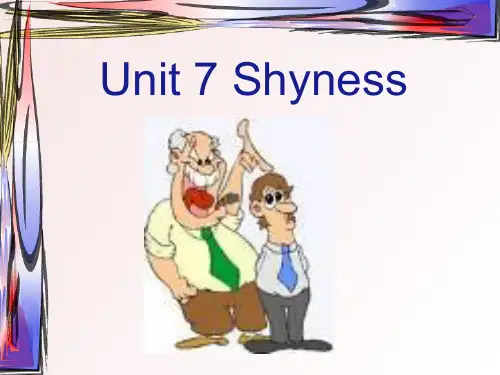
1, definite ['definit]adj. 一定的;确切的2, resolution [,rezə'lu:ʃən, -,lju:-] n. [物] 分辨率;决议;解决;决心3, gardener ['ɡɑ:dənə]n. 园丁;花匠;园艺家4, growl [ɡraul]n. 咆哮声;吠声;不平vt. 咆哮;(雷电,炮等)轰鸣vi. 咆哮着说5, club [klʌb]n. 俱乐部,社团;夜总会;棍棒;(扑克牌中的)梅花adj. 俱乐部的vt. 用棍棒打;募集vi. 集资;组成俱乐部6, French-Canadian加拿大国籍的法国人e.g: Chinese Amercian:美籍华人7, leash [li:ʃ]n. 皮带;束缚vt. 束缚;用皮带绑住8, harness ['hɑ:nis]n. 马具;甲胄;挽具状带子;降落伞背带vt. 治理;套;驾驭;披上甲胄9, harsh [hɑ:ʃ]adj. 严厉的;严酷的;刺耳的;粗糙的;刺目的10, expose [ik'spəuz]vt. 揭露,揭发;使曝光;显示11, deal [di:l]n. 交易;(美)政策;待遇;份量vi. 处理;讨论;对待;做生意vt. 处理;给予;分配;发牌12, exploitation [,eksplɔi'teiʃən] n. 开发,开采;利用;广告推销13, let go放开;释放;发射14, crashn. 撞碎;坠毁;破产;轰隆声;睡觉vi. 摔碎;坠落;发出隆隆声;(金融企业等)破产vt. 打碎;使坠毁、撞坏;[口语]擅自闯入15, chase away赶走;驱逐16, punctuation [,pʌŋktju'eiʃən]n. 标点;标点符号17, definition [,defi'niʃən]n. 定义;[物] 清晰度;解说18, definitive [di'finitiv]n. 限定词adj. 决定性的;最后的;限定的19, parenthesen. 括号;圆括号20, judiciously [dʒu:'diʃəsli]adv. 明智而审慎地;明断地21, budget ['bʌdʒit]n. 预算,预算费adj. 廉价的vt. 安排,预定;把…编入预算vi. 编预算,做预算22, chore [tʃɔ:]n. 家庭杂务;日常的零星事务;讨厌的或累人的工作23, showman ['ʃəumən]n. 玩杂耍的人;马戏团的老板;表演者24, timid ['timid]adj. 胆小的;羞怯的25, clan [klæn]n. 宗族;部落;集团26, sledge [sledʒ]n. 雪橇;大锤vt. 用雪橇搬运;乘雪橇;用大锤打vi. 用大锤打;猛击;乘雪橇27, rabies ['reibi:z]n. [内科] 狂犬病,恐水病28, vanity ['vænəti]n. 虚荣心;空虚;浮华;无价值的东西。
unit7英语泛读教程第三册Unit 7 A Room of One’s own2.Mastery of some language points3. Learning something about the author Virginia Woolf4. Learning something about feminist movement5. Learning something about women’s status in Britain2. Mastery of some difficult language points3. Learning women’s status in British societyin the book.2. Students might have difficulty in some of the words and phrases.3.Students may think that women are equal to men in Britain.About two periods of class will be used for the analysis and discussion of the passage itself.Total class hours: three periods1. Title:(1) What does ―room‖ mean here?(2)What does ―one’s‖ refer to?2, Related Information(1)Virginia Woolf (1882-1941)Adeline) Virginia Woolf (née Stephen; 25 January1882–28 March1941) was an English novelist and essayist regarded as one of the foremost modernist literary figures of the twentieth century.During the interwar period, Woolf was a significant figure in London literary society and a member of the Bloomsbury Group. Her most famous works include the novels Mrs Dalloway (1925), To the Lighthouse (1927), and Orlando (1928), and the book-length essay A Room of One's Own (1929) with its famous dictum, "a woman must have money and a room of her own if she is to write fiction."Personal lifeVirginia Stephen married writer Leonard Woolf in 1912, referring to him during their engagement as a "penniless Jew." The couple shared a close bond, and in 1937Woolf wrote in her diary "Love-making —after 25 years can’t be attained by my unattractive countenance ... you see it is enormous pleasure being wanted, a pleasure that I have never felt." They also collaborated professionally, in 1917 founding the Hogarth Press, which subsequently published most of Woolf's work.[2] The ethos of Bloomsbury discouraged sexual exclusivity, and in 1922, Woolf met Vita Sackville-West. After a tentative start, they began a relationship that lasted through most of the 1920s.[3]In 1928, Woolf presented Sackville-West with Orlando, a fantastical biography in which the eponymous hero's life spans three centuries and both genders. It has been called by Nigel Nicolson, Vita Sackville-West's son, "the longest and most charming love letter in literature."[4] After their affair ended, the two women remained friends until Woolf's death.DeathAfter completing the manuscript of her last (posthumously published) novel Between the Acts, Woolf fell victim to a depression similar to that which she had earlier experienced. The war, the Luftwaffe's destruction of her London homes, as well asthe cool reception given to her biography of her late friend Roger Fry, worsened her condition until she was unable to work.[5] On 28 March1941, rather than having another nervous breakdown, Woolf drowned herself by weighing her pockets with stones and walking into the River Ouse near her home. Her body was not found until April 18. Her husband buried her remains undera tree in the garden of their house in Rodmell, Sussex.(2)William Shakespeare(baptised26 April1564–23 April1616)[a]was an English poet and playwright, widely regarded as the greatest writer in the English language and the world's pre-eminent dramatist.[1] He is often called England's national poet and the "Bard of Avon" (or simply "The Bard"). His surviving works consist of 38 plays,[b] 154 sonnets, two long narrative poems, and several other poems. His plays have been translated into every major living language, and are performed more often than those of any other playwright.[2] Shakespeare was born and raised in Stratford-upon-Avon. At the age of 18 he married Anne Hathaway, who bore him three children: Susanna, and twins Hamnet and Judith. Between 1585 and 1592 he began a successful career in London as an actor, writer, and part owner of the playing company the Lord Chamberlain's Men, later known as the King's Men. He appears to have retired to Stratford around 1613, where he died three years later. Few records of Shakespeare's private life survive, and there has been considerable speculation about such matters as his sexuality, religious beliefs, and whether the works attributed to him were written by others.[3] Shakespeare produced most of his known work between 1590 and 1613. His early plays were mainly comedies and histories, genres he raised to the peak ofsophistication and artistry by the end of the sixteenth century. Next he wrote mainly tragedies until about 1608, including Hamlet, King Lear, and Macbeth, considered some of the finest examples in the English language. In his last phase, he wrote tragicomedies, also known as romances, and collaborated with other playwrights.Many of his plays were published in editions of varying quality and accuracy during his lifetime, and in 1623, two of his former theatrical colleagues published the First Folio, a collected edition of his dramatic works that included all but two of the plays now recognised as Shakespeare's.Shakespeare was a respected poet and playwright in his own day, but his reputation did not rise to its present heights until the nineteenth century. The Romantics, in particular, acclaimed Shakespeare's genius, and the Victorians hero-worshipped Shakespeare with a reverence that George Bernard Shaw called "bardolatry".[4]In the twentieth century, his work was repeatedly adopted and rediscovered by new movements in scholarship and performance. His plays remain highly popular today and are consistently performed and reinterpreted in diverse cultural and political contexts throughout the world.3. Warming-up questionAre there any inequality between men and women in your surroundings? Please give some expels if the answer is yes.4. Text analysisA Room of One’s Own (1929);(now regarded as a classic feminist work)All I could do was to offer you an opinion upon one minor point—a woman must have money and a room of her own if she is to write fiction; and that, as you will see, leaves the greatproblem of the true nature of woman and the true nature of fiction unsolved.(1) Themes, Motifs & Symbols#ThemesThe Importance of MoneyFor the narrator of A Room of One’s Own, money is the primary element that prevents women from having a room of their own, and thus, having money is of the utmost importance. Because women do not have power, their creativity has been systematically stifled throughout the ages. The narrator writes, ―Intellectual freedom depends upon material things. Poetry depends upon intellectual freedom. And women have always been poor, not for two hundred years merely, but from the beginning of time . . .‖ She uses this quotation to explain why so few women have written successful poetry. She believes that the writing of novels lends itself more easily to frequent starts and stops, so women are more likely to write novels than poetry: women must contend with frequent interruptions because they are so often deprived of a room of their own in which to write. Without money, the narrator implies, women will remain in second place to their creative male counterparts. The financial discrepancy between men and women at the time of Woolf’s writing perpetuated the myth that women were less successful writers.The Subjectivity of TruthIn A Room of One’s Own, the narrator argues that even history is subjective. What she seeks is nothin g less than ―the essential oil of truth,‖ but this eludes her, andshe eventually concludes that no such thing exists. The narrator later writes, ―When a subject is highly controversial, onecannot hope to tell the truth. One can only show how one c ame to hold whatever opinion one does hold.‖ To demonstrate the idea that opinion is the only thing that a person can actually ―prove,‖ she fictionalizes her lecture, claiming, ―Fiction is likely to contain more truth than fact.‖ Reality is not objective: rather, it is contingent upon the circumstances of one’s world. This argument complicates her narrative: Woolf forces her reader to question the veracity of everything she has presented as truth so far, and yet she also tells them that the fictional parts of any story contain more essential truth than the factual parts. With this observation she recasts the accepted truths and opinions of countless literary works.#MotifsInterruptionsWhen the narrator is interrupted in A Room of One’s Own, she generally fails to regain her original concentration, suggesting that women without private spaces of their own, free of interruptions, are doomed to difficulty and even failure in their work. While the narrator is describing Oxbridge University in chapter one, her attention is drawn to a cat without a tail. The narrator finds this cat to be out of place, and she uses the sight of this cat to take her text in a different direction. The oddly jarring and incongruous sight of a cat without a tail—which causes the narrator to completely lose her train of thought—is an exercise in allowing the reader to experience what it might feel like to be a woman writer. Although the narrator goes on to make an interesting and valuable point about the atmosphere at her luncheon, she has lost her original point. This shift underscores her claim that women, who so often lack a room of their own and the time to write, cannot compete against the menwho are not forced to struggle for such basic necessities.Gender InequalityThroughout A R oom o f One’s Own, the narrator emphasizes the fact that women are treated unequally in her society and that this is why they have produced less impressive works of writing than men. To illustrate her point, the narrator creates a woman named Judith Shakespeare, the imaginary twin sister of William Shakespeare. The narrator uses Judith to show how society systematically discriminates against women. Judith is just as talented as her brother William, but while his talents are recognized and encouraged by their family and the rest of their society, Judith’s are underestimated and explicitly deemphasized. Judith writes, but she is secretive and ashamed of it. She is engaged at a fairly young age; when she begs not to have to marry, her beloved father beats her. She eventually commits suicide. The narrator invents the tragic figure of Judith to prove that a woman as talented as Shakespeare could never have achieved such success. Talent is an essential component of Shakespeare’s success, but because women are treate d so differently, a female Shakespeare would have fared quite differently even if she’d had as much talent as Shakespeare did.#SymbolsA Room of One’s OwnThe central point of A Room of One’s Own is that every woman needs a room of her own—something men are able to enjoy without question. A room of her own would provide a woman with the time and the space to engage in uninterrupted writing time. During Woolf’s time, women rarely enjoyed these luxuries. They remained elusive to women, and, as a result, their art suffered. But Woolf is concerned with more than just the roomitself. She uses the room as a symbol for many larger issues, such as privacy, leisure time, and financial independence, each of which is an essential component of the countless inequalities between men and women. Woolf predicts that until these inequalities are rectified, women will remain second-class citizens and their literary achievements will also be branded as such. (2) Key ideas of each partPara.1 She tried to find some information about women in history but failed——to little information.Para.2 Contrast:Imaginatively (in fiction) ——very important,, very greatpractically (in historical records as well as in history) ——insignificant Para.3. Since there were few facts about women in history, she suggested to rewrite history.Para.4.She tried to create an imaginary figure who was as brilliant as William Shakespeare, but there was no doubt about the tragic fate about this Judith Para.5-6 Again She emphasized the point that women had no place in history.(3) Summary of A Room of One's OwnThe dramatic setting of A Room of One's Own is that Woolf has been invited to lecture on the topic of Women and Fiction. She advances the thesis that "a woman must have money and a room of her own if she is to write fiction." Her essay is constructed as a partly-fictionalized narrative of the thinking that led her to adopt this thesis. She dramatizes that mental process in the character of an imaginary narrator ("call me Mary Beton, Mary Seton, Mary Carmichael or by any name you please—it is not a matter of any importance") who is in her same position, wrestling with the same topic.The narrator begins her investigation at Oxbridge College,where she reflects on the different educational experiences available to men and women as well as on more material differences in their lives. She then spends a day in the British Library perusing the scholarship on women, all of which has written by men and all of which has been written in anger. Turning to history, she finds so little data about the everyday lives of women that she decides to reconstruct their existence imaginatively. The figure of Judith Shakespeare is generated as an example of the tragic fate a highly intelligent woman would have met with under those circumstances. In light of this background, she considers the achievements of the major women novelists of the nineteenth century and reflects on the importance of tradition to an aspiring writer. A survey of the current state of literature follows, conducted through a reading the first novel of one of the narrator's contemporaries. Woolf closes the essay with anexhortation to her audience of women to take up the tradition that has been so hardly bequeathed to them, and to increase the endowment for their own daughters.5. Key words and expressions(1) avarice(2) memoir(3) anecdote(4) whisk away(5) parish register (6) poach(7) on the sly(8) lust(9) on the track of(10) wizard5. Topic for Discussion(1)Why does Virginia Woolf suggest rewriting history?(2) What does the story of the imagined Shakespeare’s sister signify?(3) Do you agree with Woolf when she says that genius like Shakespeare’s is notborn today among the working class? Explain.6.Exercises about the text7. Reading skills: Reading the Feature Story in a Newspaper8. Fast Reading & Exercises2.Preview Unit 8。
Unit7OvercomeShyness泛读教程Unit 8 Overcome ShynessShyness causes much unhappiness for a great many people. All kinds of people describe themselves as shy: short, tall, dull, intelligent, young, old, slim, overweight. Shy people are anxious and self-conscious; that is, they are excessively concerned with their own appearance and action. Worrisome thoughts are constantly swirling in their minds: What kind of impression am I making? Do they like me? Do I sound stupid? I’m ugly. I’m wearing unattractive clothes.It is obvious that such uncomfortable feelings must affect people adversely. A person’s self-concept is reflected in the way he or she behaves, and, in general, the way people think about themselves has a profound effect on all areas of their lives. the way people think about themselves has a positive sense of self-worth or high self-esteem usually act with confidence .because they have self-assurance, they do not need constant praise and encouragement from others to feel good about themselves. Self-confident people participate in life enthusiastically and spontaneously(自发地,本能地). For instance, people who have a positive sense of self-worth or high self-esteem usually act with confidence. They do not need constant praise and encouragement from others to feel good about themselves. Self-confident people are their own best friends. They participate in life enthusiastically and spontaneously. They are not affected by what others think they “should” do. People with high self-esteem are not hurt by criticism; they do not regard criticism as a personal rejection. Instead, they view a criticism as a suggestion for improvement.In contrast, shy people, having low self-esteem, are likely to be passive and easily influenced by others. They need reassurance that they are doing “the right thing”. Shy people are very sensitive to criticism; they feel that it confirms their inferiority. They also find it difficult to be pleased by compliments because they are unworthy of praise. A shy person may respond to a compliment with a statement like this one: “you are just saying that to make me feel good. I know it’s not true.” It is clear that, while self-awareness is a healthy quality, overdoing it is detrimental, or harmful.Can shyness be completely overcome, or at least reduced?Fortunately, people can overcome shyness with determined and patient effort in building self-confidence. Since shyness goes hand in hand with a lack of self-esteem, it is important for people to accept their weakness as well as their strengths. For example, most people would like to be “A” students in every subject. It is not fair for them to label themselves as inferior because they have di fficultly in some areas. People’s expectations of themselves must be realistic. Dwelling on the impossible leads to a sense of inadequacy and even feelings of envy or jealousy. We are self-destructive when we envy a student who gets better grades.If you are shy here are some specific helpful steps toward building self-confidence and overcoming shyness.1. Recognize your personal strengths and weaknesses. Everyone has both. As self-acceptance grows, shyness naturally diminishes.2. Set reasonable goals. For example, you may be timid about being with a group of strangers at a party. Don’t feel that you must converse with everyone. Concentrate on talking to only oneor twopeople. You will feel more comfortable.3. Guilt and sham e are destructive feelings. Don’t waste time and energy on them. Suppose you have hurt someone’s feelings. Feeling shame accomplishes nothing. Instead, accept the fact that you make a mistake, and make up your mind to be more sensitive in the future.4. There are numerous approaches to all issues. Few opinions are completely right or wrong. Don’t be afraid to speak up and give you point of view.5. Do n’t make negative comments about yourself. This is a form of self-rejection. Avoid describing yourself as stupid, ugly, worthless, or a failure. Instead, stress the positive.6. Accept criticism thoughtfully. Do not interpret it as a personal attack. If, for example, a friend complains your cooking, accept it as a comment on your cooking ,not yourself. Be assured that you are still good friends, but perhaps your cooking could improve.7. Remember that everyone experience some failure and disappointments. Profit from them as learning experiences. Very often, a disappointment become a turning point for a wonderful experience to come along. For instance, you may be rejected by the college of your choice. However, at the college you actually attend, you may find a quality of education beyond what you had expected.8. Do not associate with people who make you feel inadequate. Try to change their attitude or yours, or remove yourself from the relationship. People who hurt you do not have your best interests at heart.9. Set aside time to relax, enjoy hobbies, and reevaluate yourgoals on a regular basis. Time spent this way helps you learn more about yourself.10. Practice being in social situa tions. Don’t isolate yourself from people. Try making one acquaintance at a time; eventually you will circulate in large groups with skill and self-assurance.Each one of us is a unique, worthwhile individual. We are interesting in our own personal ways. The better we understand ourselves, the easier it becomes to live up to our full potential. Let’s not allow shyness to block our chances for a rich and fulfilling life.。
Unit 11 TextFromLittle House in the Big WoodsBy Laura Ingalls WilderLaura Ingalls Wilder wrote many books about her life in the wilderness. This is a true story from one of her books. On the edge of the Big Woods of Wisconsin in 1872, she lived with her family in a little log house. It was miles from any neighbors and far from any town. One day her father was away from home, leaving the family alone in the wilderness. At night there came a big bear. What were the mother and her daughters going to do? Were they safe in the end? Please read the following story.Then one day Pa said that spring was coming.In the Big Woods the snow was beginning to thaw. Bits of it dropped from the branches of the trees and made little holes in the softening snowbanks below. At noon all the big icicles along the eaves of the little house quivered and sparkled in the sunshine, and drops of water hung trembling at their tips.Pa said he must go to town to trade the furs of the wild animals he had been trapping all winter. So one evening he made a big bundle of them. There were so many furs that when they were packed tightly and tied together they made a bundle almost as big as Pa.Very early one morning Pa strapped the bundle of furs on his shoulders, and started to walk to town. There were so many furs to carry that he could not take his gun.Ma was worried, but Pa said that by starting before sun-up and walking very fast all day he could get home again before dark.The nearest town was far away. Laura and Mary had never seen a town. They had never seen a store. They had never seen even two houses standing together. But they knew that in a town there were many houses, and a store full of candy and calico and other wonderful things—powder, and shot, and salt, and store sugar.They knew that Pa would trade his furs to the storekeeper for beautiful things from town, and all day they were expecting the presents he would bring them. When the sun sank low above the treetops and no more drops fell from the tips of the icicles they began to watch eagerly for Pa.The sun sank out of sight, the woods grew dark, and he did not come. Ma started supper and set the table, but he did not come. It was time to do the chores, and still he had not come.Ma said that Laura might come with her while she milked the cow. Laura could carry the lantern.So Laura put on her coat and Ma buttoned it up. And Laura put her hands into her red mittens that hung by a red yarn string around her neck, while Ma lighted the candle in the lantern.Laura was proud to be helping Ma with the milking, and she carried the lantern very carefully. Its sides were of tin, with places cut in them for the candle-light to shine through.When Laura walked behind Ma on the path to the barn, the little bits of candle-light from the lantern leaped all around her on the snow. The night was not yet quite dark. The woods were dark, but there was a gray light on the snowy path, and in the sky there were a few faint stars. The stars did not look as warm and bright as the little lights that came from the lantern.Laura was surprised to see the dark shape of Sukey, the brown cow, standing at the barnyard gate. Ma was surprised, too.It was too early in the spring for Sukey to be let out in the Big Woods to eat grass. She lived in the barn. But sometimes on warm days Pa left the door of her stall open so she could come into the barnyard. Now Ma and Laura saw her behind the bars, waiting for them.Ma went up to the gate, and pushed against it to open it. But it did not open very far, because there was Sukey, standing against it. Ma said, "Sukey, get over!" She reached across the gate and slapped Sukey's shoulder.Just then one of the dancing little bits of light from the lantern jumped between the bars of the gate, and Laura saw long, shaggy, black fur, and two little, glittering eyes.Sukey had thin, short, brown fur. Sukey had large, gentle eyes.Ma said, "Laura, walk back to the house."So Laura turned around and began to walk toward the house. Ma came behind her. When they had gone part way, Ma snatched her up, lantern and all, and ran. Ma ran with her into the house, and slammed the door.Then Laura said, "Ma, was it a bear?""Yes, Laura," Ma said. "It was a bear."Laura began to cry. She hung on to Ma and sobbed, "Oh, will he eat Sukey?""No," Ma said, hugging her. "Sukey is safe in the barn. Think, Laura—all those big, heavy logs in the barn walls. And the door is heavy and solid, made to keep bears out. No, the bear cannot get in and eat Sukey.”"Laura felt better then. "But he could have hurt us, couldn't he?" she asked."He didn't hurt us," Ma said. "You were a good girl, Laura, to do exactly as I told you, and to do it quickly, without asking why."Ma was trembling, and she began to laugh a little. "To think," she said, "I've slapped a bear!"Then she put supper on the table for Laura and Mary. Pa had not come yet. He didn't come. Laura and Mary were undressed, and they said their prayers and snuggled into the trundle bed.Ma sat by the lamp, mending one of Pa's shirts. The house seemed cold and still and strange, without pa.Laura listened to the wind in the Big Woods. All around the house the wind went crying as though it were lost in the dark and the cold. The wind sounded frightened.Ma finished mending the shirt. Laura saw her fold it slowly and carefully. She smoothed it with her hand. Then she did a thing she had never done before. She went to the door and pulled the leather latch-string through its hole in the door, so that nobody could get in from outside unless she lifted the latch. She came and took Carrie, all limp and sleeping, out of the big bed.She saw that Laura and Mary were still awake, and she said to them: "Go to sleep, girls. Everything is all right. Pa will be here in the morning." Then she went back to her rocking chair and sat there rocking gently and holding Baby Carrie in her arms.She was sitting up late, waiting for Pa, and Laura and Mary meant to stay awake, too, till he came. But at last they went to sleep.In the morning Pa was there. He had brought candy for Laura and Mary, and two pieces of pretty calico to make them each a dress. Mary's was a china-blue pattern on a white ground, and Laura's was dark red with little golden-brown dots on it. Ma had calico for a dress, too; it was brown, with a big, feathery white pattern all over it.They were all happy because Pa had got such good prices for his furs that he could afford to get them such beautiful presents.The tracks of the big bear were all around the barn, and there were marks of his claws on the walls. But Sukey and the horses were safe inside. All that day the sun shone, the snow melted, and little streams of water ran from the icicles, which all the time grew thinner. Before the sun set that night, the bear tracks were only shapeless marks in the wet, soft snow.(1,236 words) 译文:森林中的小屋劳拉·英格尔·威尔德劳拉·英格尔·威尔德写了很多书,讲述她在荒野里的生活。
College English Reading Course 1Unit 7Text 19 The TitanicI. Vocabulary《大学英语课程教学要求》(积极词汇用红色下划线标出)一般要求(4级)词汇:voyage n. 航海;航行luxury 奢侈, 豪华; 奢华的物品furniture 家具routine desperate 绝望的, 不顾一切的, 拼命的, 孤注一掷的cabin valuable n. 贵重物品survive v. 幸存, 生还(survivor生还者)lower v. 放下, 降下(e.g. to lower the lifeboat into water) anniversary millionaire更高要求词汇:maiden n. 少女, 处女; adj. 首次的或初次的Useful Phrases and Expressions:maiden voyage 初航first-class passengers 一等舱旅客keep in contact with: keep in touch with daily routines 日常事务It was half an hour before the first-class passengers realized that …. : After half an hour,…life jacket救生衣great-grandchildren 曾孙get over (the experience of) be better informed about 更好地获取有关…的信息II. Difficult Language Points in the Text1. Her rich, first-class passengers enjoyed more luxuries than on almost any other ship before. (Line 7)Paraphrase: The rich, first-class passengers enjoyed better facilities provided by the ship. No other ship before could compete with it.Translation: 泰坦尼克号上富有的一等舱旅客享受着几乎比以往任何游船更多的豪华设施。
2. The third-class passengers had very small rooms deep down in the ship, and they did not enjoy any of the luxuries for which the Titanic was so famous. (Line 18)Paraphrase: The third-class passengers stayed in the small rooms in the low part of the ship. They could not enjoy the good facilities of the ship. And the Titanic was famous for those facilities. Translation: 三等舱旅客住在船底的小房间里,他们无从享受任何泰坦尼克号引以为豪的豪华设施。
3. It was half an hour before the first-class passengers realized that something had happened. (Line 52)Paraphrase: Half an hour later, the first-class passengers got to know that something had happened to the ship.Translation: 半个小时以后,一等舱旅客才意识到发生了什么事情。
4. For some, the long journey up through the ship took more than one hour. (Line 55) Paraphrase: It took some people more than an hour to came up from the lower part of the ship to the Ul5 deck.Translation: 对于有些人来说,从船底爬到上面是一个漫长的过程,用了一个多小时才完成。
5. Suddenly, all the lights went out, and where there had been laughter and light, there were suddenly screams and darkness. (Line 72)Paraphrase: Suddenly, all the lights went out. The places where there had been laughter and light now became dark and full of screams.Translation: 突然所有的灯都熄灭了。
曾经是欢声笑语\灯火通明的地方突然间充满尖叫和黑暗。
6. As a result of the Titanic disaster, she met her husband, Fred, to whom she was happily married for sixty years. (Line 82)Paraphrase: Because of the tragedy of the Titanic, she met her husband, Fred. She married him and lived happily for sixty years.Translation: 由于泰坦尼克号沉船事件,她遇到她的丈夫弗雷德,她嫁给了他并且度过了60年的幸福婚姻生活。
7. A few years later, an international organization was started, so that ships would be better informed about icebergs. (Line 110)Paraphrase: A few years later, an international organization was established, so that ships would be better served with information about icebergs.Translation: 以后,一个国际组织成立起来,以确保船只更好地获取有关冰山的信息。
III. Key to ExercisesI. 1. D 2. C 3. A 4. C 5. AII. 1. On April 10th, 1912.2. The look-out boy.3. The Titanic was 268 metres long, 32 metres high, and it weighed over 60,000 tonnes.4. Yes. It changed some survivors' lives and characters, and many others never got over their experience of the disaster.Key to the Reading-Skill Exercises1. to move (to)2. to join with somebody to make a pair3. to exchange4. without movement or soundText 20 A Lamp in a WindowI. Vocabulary《大学英语课程教学要求》(积极词汇用红色标出)一般要求(4级)词汇:agreeable 令人愉快的, 和蔼可亲的, 易相处的reception liquor approximately drunk 喝醉了的cf. drunken (仅用作定语) 醉的; 醉酒引起的, 酒后的drunk driver (a driver whose alcohol level exceeds the legal limit) 饮酒过量的司机drunken driver 喝醉了的司机weave considerable insult v. 侮辱; 辱骂extraordinary eventually temporary 暂时的, 临时的presently curse v. 诅咒, 咒骂(cursed该死的, 可恶的) sight vt. 看见;发现garage 车库; 汽车修理厂isolate使隔离, 使孤立due (应做的; 应得的e.g. He’s due to retire next year.) stroke can v. 把…装罐shelter避难所, 避身处, 收容所reverse vt. 颠倒, 反转generous (n. generosity)toss扔,投crumb碎屑, 面包屑较高要求(6级)词汇:wary strand v. 搁浅, 使陷于困境indignant indignation愤慨, 义愤sniff illuminate Catholic scrap碎片,小块exception n. 例外(exceptional) shabby expire更高要求词汇:chauffeur habitat (动植物的)产地、栖息地(habitation 居住, 住所) chatterbliss (天赐的)福, 极大幸福(blissful) quilt rattle v. 发出卡嗒卡嗒声Useful Phrases and Expressions:in one’s early forties 四十刚出头be wary of 留意; 谨防involved 投入的, 专注的, 专心做(be involved in)of one’s own accord自愿地, 主动地swipe against: bump into (swipe v. 挥臂猛击, 重击; 碰擦,擦过)frame cottage 木造的, 木结构的wonder aloud 说出内心的疑惑Something will turn up. 总会有办法的。